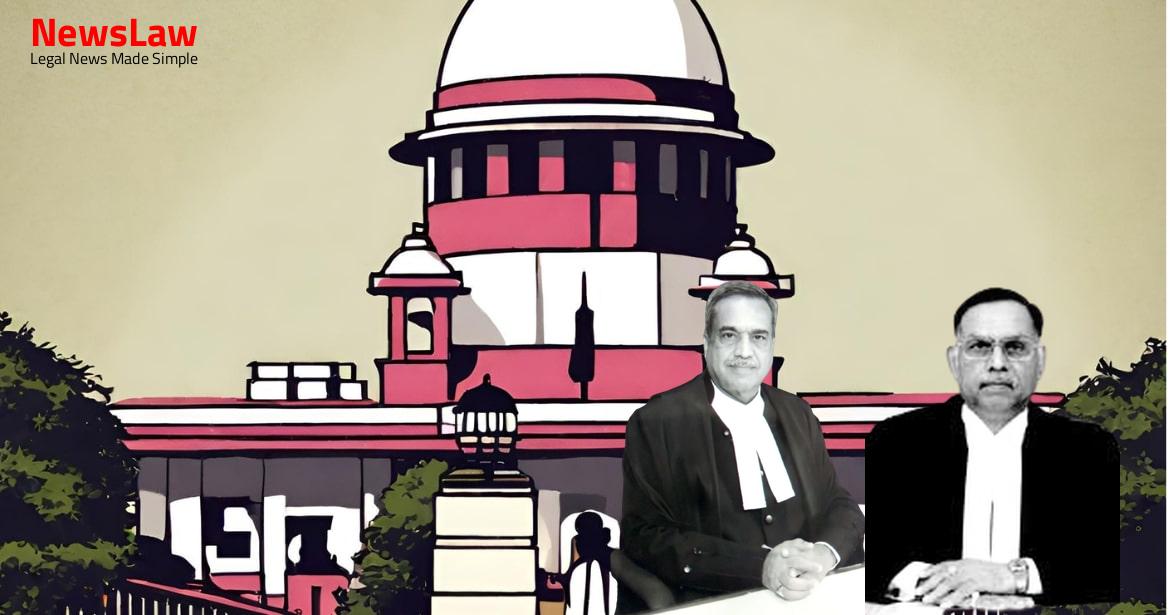Delve into the legal complexities surrounding the filing of a complaint on behalf of a company under the NI Act. The court’s thorough analysis emphasizes the significance of meeting essential elements such as proper authorization and documentation. Understanding these key aspects is crucial for ensuring the legitimacy of legal proceedings in cases involving negotiable instruments. #LegalAnalysis #CompanyLaw #NIAct
Facts
- The appellant contended that the complaint was filed on behalf of the Company by Mr. Bhupesh Rathod, described as the Managing Director.
- The Company was registered under the Companies Act, 1956, but the registration certificate was not submitted as evidence.
- The trial court acknowledged that the complaint was on behalf of the Company, as required by Section 142(a) of the NI Act.
- The respondent objected, claiming the complaint was filed in Mr. Bhupesh Rathod’s personal capacity, not as a representative of the Company.
- The complaint alleged that Rs.1,60,000 was lent to the respondent by the Company, and cheques issued for repayment bounced due to insufficient funds.
- A Board Resolution dated 17.05.2006 authorized legal action against the respondent for the dishonored cheques, appointing Mr. Bhupesh Rathod for this purpose.
- Legal notices were sent to the respondent under Section 138(b) of the NI Act on 26.05.2006.
- The High Court, in its order dated 03.08.2015, dismissed the appeal.
- The High Court considered various aspects, including the presentation of multiple cheques for payment on the same day.
- The trial court acquitted the respondent on 12.03.2009 citing lack of documentation for the loan and unsigned Board Resolution.
- The appellant appealed to the High Court against the respondent’s acquittal.
Also Read: Supreme Court Judgment on Single Till Mechanism for HRAB Calculation: A Comprehensive Analysis
Arguments
- The appellant argued that the complaint was filed on behalf of the Company, as evident from the cause title and the attached Board Resolution authorizing the Managing Director to file the complaint.
- The address provided in the complaint was the registered office address of the Company, further supporting the claim that it was filed on behalf of the Company.
- The affidavit filed during cross-examination confirmed that the complaint was indeed filed by the Managing Director of the Company.
- The appellant pointed out that there was a presumption under Section 139 and 118 of the NI Act in favor of the complainant, which was not rebutted by the respondent.
- Referring to the case Triyambak S. Hegde v. Sripad, the appellant argued that a duly signed cheque was sufficient to raise a presumption under Section 139 of the NI Act against the respondent.
- It was highlighted that the respondent did not claim in defense that the cheque was not signed by him or was signed under fraud or misrepresentation.
- The appellant criticized the hyper-technical view taken, emphasizing that the issue only related to the format of filing the complaint and not the substance.
- The respondent argued that the complaint was not in a proper form and the appellant failed to prove the case beyond reasonable doubt.
- There was no signed Board Resolution authorizing the complainant to file the complaint on behalf of the Company.
- The respondent claimed that no loan was advanced by the Company and it was not proven whose account the alleged loan was advanced to.
- The complaint and Board Resolution did not establish that it was filed on behalf of the Company.
- No loan agreement in favor of the Company was provided as evidence.
- The respondent did not challenge the summoning order on the basis that the complaint was not filed on behalf of the Company.
Analysis
- Section 142(1)(a) specifies that the complaint must be by the payee or holder in due course.
- The respondent did not argue that the nature of the transaction fell outside of Section 138.
- A de facto complainant can represent a company in court proceedings.
- The court can look to a natural person to represent a juristic person like a company.
- The format of the complaint, even if not perfect, had the essential elements required by law.
- Signatures on the cheques were not denied, and a Board Resolution was filed with the complaint.
- The complaint did not need a separate loan agreement as the nature of the transaction was clear.
- The Managing Director’s role in filing the complaint on behalf of the Company was justified.
- The High Court noted that the demand notice was sent on behalf of the Company, recognizing the need for the Company to file the complaint itself.
- The format of the authorisation, although not perfect, was deemed sufficient for legal actions.
- The courts below breached judicial precedents by nullifying the finding of lack of authorisation to depose.
- The complaint was supported by affidavits and cross-examinations during the trial, confirming its legitimacy.
- Section 138 of the Negotiable Instruments Act specifies that no court can take cognizance of an offense punishable under this section without a written complaint by the payee or holder of the cheque.
- The complaint must be made within one month of the date when the cause of action arises.
- The court may still take cognizance of a complaint after the prescribed period if the complainant can show sufficient cause for the delay.
- Offenses under section 138 involve the dishonor of a cheque due to insufficient funds in the account.
- The holder of the cheque is presumed to have received it for the discharge of a debt or liability unless proven otherwise.
- Presumptions regarding negotiable instruments, including the status of the holder in due course, are outlined in sections 118 and 139 of the Act.
- The provision in section 142 allows for the cognizance of offenses under the Act, overriding the Code of Criminal Procedure.
- The complaint was properly instituted against the respondent.
- The respondent failed to disclose why he did not meet the financial liability to the payee of a cheque in due course.
- Both the orders of the trial court and the High Court cannot be sustained and need to be set aside.
Also Read: Selection and Appointment of Judicial Officers in Himachal Pradesh
Decision
- The appeal stands allowed on the mentioned terms.
- If the respondent pays an additional sum of Rs.1,60,000 to the appellant, the sentence would be suspended.
- The punishment for the offence under Section 138 of the NI Act includes imprisonment for up to two years, fine up to twice the amount of the cheque, or both.
- The appellant is entitled to costs.
- The respondent should be sentenced to one year’s imprisonment and a fine of Rs.3,20,000.
- Complaint was filed in July 2006.
- The respondent must comply within two months from today.
Case Title: BHUPESH RATHOD Vs. DAYASHANKAR PRASAD CHAURASIA . (2021 INSC 710)
Case Number: Crl.A. No.-001105-001105 / 2021



